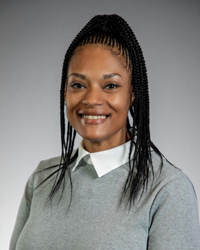Alumni Spotlight: Sheria Howard

Sheria Howard, MSW 2018
City Home Repair Program Manager, City of Kansas City, Missouri
Sheria Howard was a case worker for five years until the death of Michael Brown in 2014. She saw how the local government was handling the situation and wanted to bring change through policy.

“[Brown’s death] really pushed me and made me decide that clinical social work really wasn't going to be the way to make change for the way that I wanted to,” Howard said.
Howard decided to pursue a Master of Social Work (MSW) with a macro specialization. She graduated with her MSW in 2018. Howard now works as the city home repair program manager for the City of Kansas City, Missouri. Howard oversees funding, services and management for the program.
“The [MSW] program is awesome, even though it's intensive and it can seem rough and tough and everything. But I can honestly say that what I got from there is why I am where I am. And it's been one of the best decisions that I've made,” Howard said.
Howard shared her experience with KU’s MSW macro specialization program for a Q&A.
Q&A with Sheria Howard
What drew you to social work?
I started working for this nonprofit … and watching the case managers there, I decided, OK, this is what I want to do. I actually went to school and got a degree so I could do that work and be a case worker.
And I did that work for five years, and Ferguson happened. Michael Brown was shot and killed by a police officer. And not just the impact of his death, but just seeing how the municipality and the local government was being run there, specifically off the backs of poor and black and brown people, really pushed me and made me decide that clinical social work really wasn't going to be the way to make change for the way that I wanted to. I wanted to make change through policy. ...
I just felt like macro social work was the best way for me to advocate for change. So, I think that’s probably one of the best decisions that I made.
What’s the most rewarding part of macro social work?
I think that there's this kind of magic about it, that it makes me feel like there's not really a challenge that I can't handle. I find confidence in the fact that not only can I deal with barriers and sad stories and distraught callers, but I can also help people build generational wealth, and that I can help people stay in their homes. … I guess you would think of it like a domino effect.
It’s not just one thing. It’s not just repairing a home; it’s not just providing a furnace. It’s one thing that rewards another thing, which rewards another thing, and then that affects the community as a whole.
How has your KU MSW macro degree played a role in equipping you for your work today?
My macro social work degree ... not only helps me to be able to manage programs, manage funding, and know how to write policy and contracts. But it [MSW] also helps me deal with the public. It helps me to deal with the mayor's office, the city manager, and it helps me to deal with neighborhood associations. It helps me to deal with people who feel overlooked and distressed. … So, it's really helped me in all aspects of working with the public.
What should aspiring social workers know about macro practice?
The macro field expanded my skill set, not only from the aspect of me wanting to work from the heart and work with people and work with communities of color. … Sometimes, as hard as we work on the clinical side … the policies and red tape limit a lot of the services. ...
I wanted to be an advocate, and I felt like doing that through the government was my best bet. And so far, it's worked best for me. ...
Just pay attention to your passions and figure out what it is that you want to do and tap into the skill sets in the classes and education that are provided there. …
I can honestly say that what I got from there is why I am where I am, and it’s one of the best decisions that I’ve made.
This is the second article in a Q&A series featuring KU Master of Social Work graduates who completed a specialization in social work macro practice. Learn more about the master's degree program on the Master of Social Work program overview page.